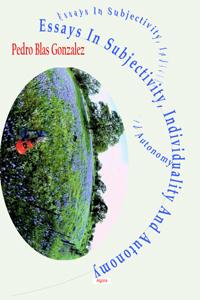
Sound Bite
Seven nuanced and sensitive essays draw readers on an introspective journey with references to Camus, Cocteau, Gabriel Marcel, Ortega, and Enrique Anderson Imbert.
About the Author
Pedro Blas Gonzalez is Associate Professor of Philosophy at Barry University in Miami. His areas of specialization include Continental philosophy, specifically: Phenomenology, Existentialism, and philosophical aspects of literature. His works include Ortega's 'Revolt of the Masses' and the New Man (Algora 2007), Fragments: Essays In Subjectivity, Individuality And Autonomy (Algora, 2005), and Human Existence as Radical Reality: Ortega’s Philosophy of Subjectivity (Paragon House, 2005). Gonzalez holds a Ph.D. in Philosophy from DePaul University. His next book is planned for 2009.
|
|
About the Book
Eschewing Ã??'hair-splitting for the sport of it,Ã??'Â Gonzalez takes a fresh look at the notion of subjectivity and the nature of the self, in seven essays. With reference to Camus, Cocteau, Gabriel Marcel, Ortega, and...
Eschewing Ã??'hair-splitting for the sport of it,Ã??'Â Gonzalez takes a fresh look at the notion of subjectivity and the nature of the self, in seven essays. With reference to Camus, Cocteau, Gabriel Marcel, Ortega, and Enrique Anderson Imbert, he explores diverse topics from the aesthetic vision and moral courage to the absurd. His nuanced and sensitive writing draws the reader on an introspective journey through a portal that subtly shifts the perception of human reality.
|
Preface
In the first chapter of the second volume of The Mystery of Being, Gabriel Marcel convincingly argues that to philosophize is to think sub specie aeterni. Immediately thereafter he anticipates the question that some critics may pose: whether to...
In the first chapter of the second volume of The Mystery of Being, Gabriel Marcel convincingly argues that to philosophize is to think sub specie aeterni. Immediately thereafter he anticipates the question that some critics may pose: whether to reflect on the nature of the self is a form of ego-centrism. His answer is resoundingly clear. Marcel reasons that sooner or later the thinker has little choice but to realize that he is one of many entities. However, this initial discovery is founded on the understanding that the reality that we experience as a subjective-I is only one aspect of objective reality. Thus, we come to the realization that subjective reality Ã??' that is, human existence Ã??' is surrounded by a wider objective realm. MarcelÃ??'s thought is illuminating, given his understanding that all reflection on the nature of the self must posit the fullness of life as a starting point. Abstractions inspire very little in terms of vital and existential existence. But to say that the self is surrounded by objective reality does not entail that it is readily absorbed by it. On the contrary, the subjective-I seeks to establish this demarcation point. The Ã??'bite of reality,Ã??'Â as Marcel has referred to this outer reality, in effect has a disquieting and centralizing consequence that keeps the thinker humble. Ego centrism, whenever this occurs, then, only results from wearing blinders. But let us now consider the question of why anyone would be concerned with the notion of subjectivity. After all, what advantage is there in giving oneself over to philosophizing on the nature of existence, to becoming burdened with the essence of being, given the extraordinary degree of distress that life naturally exhibits? Why does it seem so essential for thinkers Ã??' here, one must also include poets Ã??' to become bogged down with such weighty affairs? It is not necessary to open up a PandoraÃ??'s box by addressing the complexity that Ã??'beingÃ??'Â suggests, for it seems to me that the days of hair-splitting for the sport of it have not only failed to benefit man, but have served as a detriment to all vital philosophy. By being I merely mean the underlying substance of any existent Ã??' that is, of self-standing, self-subsisting reality. Such questions have been substantially addressed in the history of philosophy, by religion, and by science. Why, then, this overarching concern for the nature of the self? ...
|
|
Pages 200
Year: 2005
LC Classification: PN49.G632
Dewey code: 801'dc22
BISAC: LIT006000
BISAC: PHI010000
BISAC: PHI026000
Soft Cover
ISBN: 978-0-87586-370-2
Price: USD 21.95
Hard Cover
ISBN: 978-0-87586-371-9
Price: USD 27.95
eBook
ISBN: 978-0-87586-372-6
Price: USD 21.95
|













